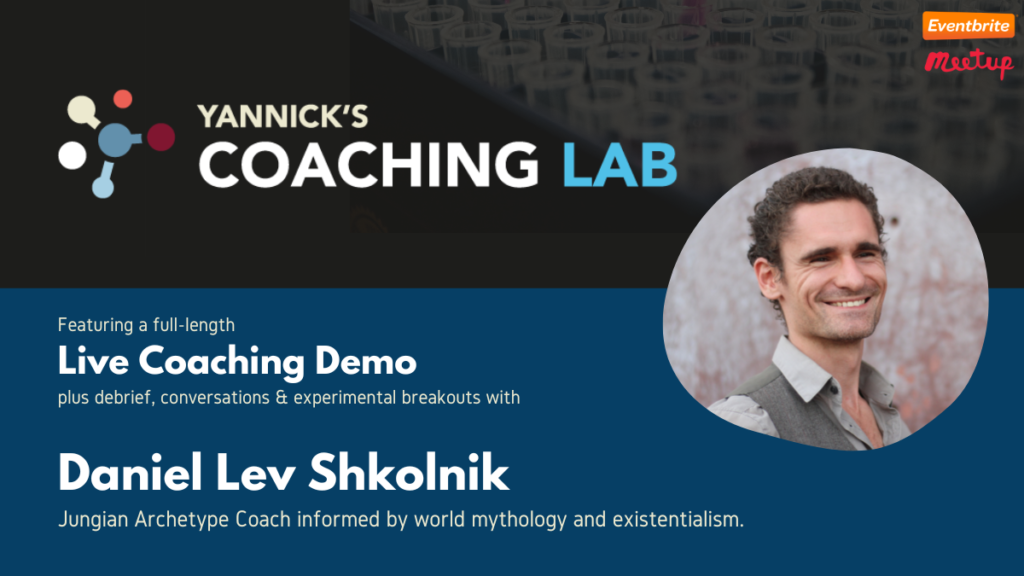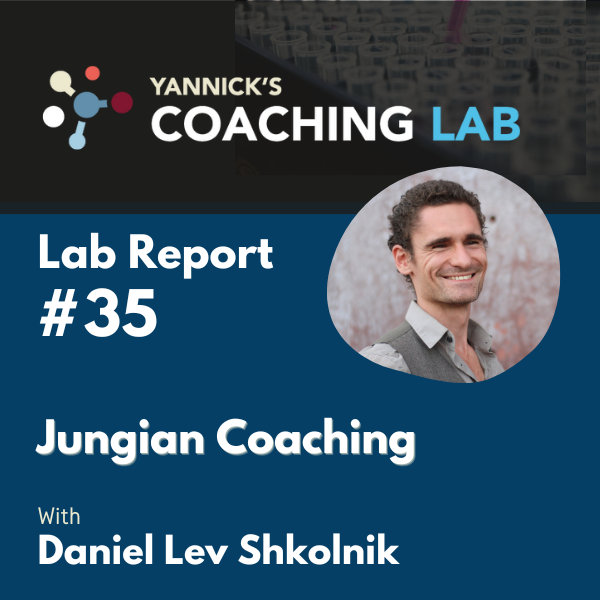
Curious to know what this session was like? Have a peek at the Lab Report below or consider VIP membership to access the full recording of this and many more exciting sessions.
Yannick’s Coaching Lab #35 — Daniel Lev Shkolnik
Lab Report by Natalie Fraser
Summary
Daniel is an old friend of Yannick’s, who has previously written the reports for Yannick’s Coaching Labs. He is trained from a diverse range of approaches, including Jungian, spirituality, mythology, and existentialism to name a few. He draws on a variety of approaches in his coaching work.
Daniel and his client have never met before this session. She is seeking ‘something more’ but feels ambiguous about what this might be.
Key Insights
Guided Meditation: Grounding
Daniel began the session briefly explaining his approach to coaching and offered suggestions of how he may work. He specifically shared that he draws on what exists within, and asked his client whether they felt comfortable to work in this way.
He then led a brief guided breathwork meditation which both he and his client participated in at the permission of his client. Daniel invited his client to not lean back but instead hold the weight of their body, preventing his client to become overly drowsy. This meditation invited ‘dropping down’ from the thinking mind into the feeling body. Daniel included his client’s goal for therapy in this meditation, inviting their yearning for change to have space and begin directing them.
Check-in
Daniel invited his client to check in with anything that the meditation may have brought up for them. The theme of “freedom” arose, and Daniel asked whether this had any relevance in his client’s life, revealing that their client felt a lack of freedom. Daniel invited his client to explore this further.
Guided Meditation: Feeling Into The Inner World
Daniel led another guided meditation, again ‘dropping down’ from mind to body, introducing the new elements of something blocking their freedom. He invited his client to listen to what parts were blocking the freedom and explored this together whilst both remaining in a meditative state. Daniel drew on practices of sending love and gratitude, using metaphors, and Internal Family Systems (IFS) throughout this exploration.
Check-in & Spiritual Education
Daniel invited his client to check-in with their experience of the meditation, and offered some spiritual education about the experience she shared based on his knowledge of process and philosophy.
Guided Meditation: Feeling Into The Past
Daniel led another guided meditation, again ‘dropping down’ from mind to body, exploring where in his client’s past she had experienced the most freedom. Daniel asked his client to reflect on a specific scene where she remember this, and invited her to really return there and experience her surroundings and feelings. This brought up many emotions for his client, including a sense of sadness arriving from loss. Permission was given to feeling these feelings.
Check-in & Thank you
Daniel closed the session with a final check in, and thanking his client for trusting him and trusting herself to experience this journey.
Key Take-Aways
Daniel felt like this session realistically represented what most of his sessions look like.
Daniel shared that the grounding at the start is for both the client and himself, allowing him to sense more clearly where he/they are starting from.
When using IFS and exploring emotional parts of the past, it is important to reflect on the boundaries between coaching and therapy, the appropriacy of what is right for the client in that moment, and the training of the coach.
Daniel finds IFS and Jungian ideas very compatible, and is drawn to IFS by its simplification of some more complex Jungian terms.
Most coaching starts with goal then looks at barriers. Daniel looked at barriers first, coming from the IFS philosophy that if the barrier/protector feels safe then it will step aside for the deeper goal to be explored.
Being in a meditative state for most of the coaching session allowed the client to feel more present and access their experiences more quickly. Trust in the coach was imperative for this.
The level of depth accessed by this style of coaching often brings up emotional vulnerability. It is worth reflecting on whether it feels appropriate for the coaching setting you’re in, for example, it can be used in executive coaching but may not always be appropriate for all clients.
Watch the recording of this session by joining the Lab as a member: www.GoCoachingLab.com
A list of all available recordings can be found at https://bit.ly/LabRecordings
This Lab Report was authored by Natalie Fraser
Natalie is an existential Counselling Psychologist, specialising in trauma and transformation, and curious about coaching. Interested in exploring life’s Big Questions? Find out more at: www.existentialofferings.com

